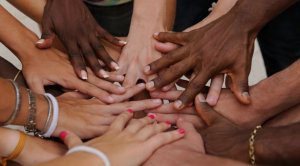 Advocating for true diversity and inclusion has never been easy. We know we’re not alone, and our work will demonstrate that fact as more people of colour reclaim their voices, write Jamil Jivani, Shuavloy Majumdar, and Kaveh Shahrooz in the Toronto Star.
Advocating for true diversity and inclusion has never been easy. We know we’re not alone, and our work will demonstrate that fact as more people of colour reclaim their voices, write Jamil Jivani, Shuavloy Majumdar, and Kaveh Shahrooz in the Toronto Star.
By Jamil Jivani, Shuavloy Majumdar, and Kaveh Shahrooz, November 30, 2020
In 2016, when delivering Howard University’s commencement address, President Obama reminded students, “There’s no one way to be black. Take it from somebody who’s seen both sides of debate about whether I’m black enough … There’s no straitjacket, there’s no constraints, there’s no litmus test for authenticity.”
Since then, a tidal shift has taken place across Western democracies, with growing hostility toward members of minority communities espousing heterodox viewpoints.
Obama’s message, once uncontroversially mainstream, is at odds with the current rhetoric of many progressives. U.S. congresswoman and proud member of “the squad,” Ayanna Pressley, famously said that Democrats do not need “any more black faces that don’t want to be a black voice” or “any more brown faces that don’t want to be a brown voice.” Rep. Pressley’s phrasing may have sounded odd, but her point was clear: historically marginalized people should only be included when they say what she wants to hear.
Tragically, this view is not limited to the political fringe. Just months ago, president-elect Joe Biden uttered in an interview “you ain’t black” if you don’t vote for him.
This suggests that progressive and liberal purveyors of “diversity” and “inclusion” may not actually appreciate what a truly diverse and inclusive society would look like. If people of colour were adequately represented in every part of public life, that would mean also participating in decidedly nonprogressive or nonliberal organizations. We would have people of colour teaching different theories in universities, donating their money to different charities, reading or watching different news media content, and yes, even voting for different political parties. That should be the best measure of a successful democracy.
Yet far too many supposed champions of diversity and inclusion insist that people of colour are only welcome if we become caricatures of what progressives and liberals think of us. Their aspiration is racially subversive: a borderless world of multicoloured progressives and liberals, worshipping at the high altar of ideological orthodoxy, under a hierarchy of grievances they cannot prioritize.
That’s why today, we, three people of colour who don’t always agree politically, are launching the Speak for Ourselves initiative to combat the pernicious ideology that reduces all differences between people to those of race, sex and other immutable characteristics. Housed at Ottawa’s Macdonald-Laurier Institute, Speak for Ourselves will highlight the work of writers and content creators who challenge the simplistic narratives imposed upon people of colour.
We believe that while each person’s views may be informed by their lived experiences, all people are unique and entitled to think and speak for themselves. It’s necessary to combat any ideology that requires people of colour to speak only in support of one world view.
Our view is rarely represented by the news media. Reporters hired to cover race and identity often develop a monotonous collection of stories affirming the same narratives that treat minorities as both monolithic and victimized. It’s as if these reporters are reading from the same script.
Importantly, supporting true diversity and inclusion is much more important than the culture wars being waged within newsrooms. True diversity and inclusion is about pluralism; it’s indispensable toward ensuring we have rigorous and fruitful debates on important policy, ethical and cultural questions. Minority communities deserve such debate over how to best address their respective challenges and opportunities, just as everyone else does.
As our governments and businesses contemplate managing a global pandemic and the subsequent economic recovery — which has disproportionately impacted people of colour — it’s paramount that a multitude of ideas are on the table for how we move forward. Simplistic narratives about who people of colour are and what we believe in simply won’t help develop the best plan. A stymied debate will only lead to worse decisions.
We know that pushing back against the tidal shift is hard, given how deeply entrenched “woke” ideology is across many institutions today. For the world’s totalitarians, conformity is the object of their oppression. And we won’t have any of it. Advocating for true diversity and inclusion has never been easy. We know we’re not alone, and our work will demonstrate that fact as more people of colour reclaim their voices.
Jamil Jivani, Shuvaloy Majumdar and Kaveh Shahrooz are senior fellows at the Macdonald-Laurier Institute.




